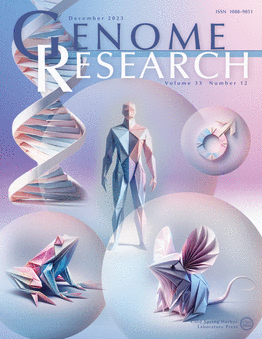Genetic complexity of killer-cell immunoglobulin-like receptor genes in human pangenome assemblies
IF 6.2
2区 生物学
Q1 BIOCHEMISTRY & MOLECULAR BIOLOGY
引用次数: 0
Abstract
The killer-cell immunoglobulin-like receptor (KIR) gene complex, a highly polymorphic region of the human genome that encodes proteins involved in immune responses, poses strong challenges in genotyping owing to its remarkable genetic diversity and structural intricacy. Accurate analysis of KIR alleles, including their structural variations, is crucial for understanding their roles in various immune responses. Leveraging the high-quality genome assemblies from the Human Pangenome Reference Consortium (HPRC), we present a novel bioinformatic tool, the structural KIR annoTator (SKIRT), to investigate gene diversity and facilitate precise KIR allele analysis. In 47 HPRC-phased assemblies, SKIRT identifies a recurrent novel KIR2DS4/3DL1 fusion gene in the paternal haplotype of HG02630 and maternal haplotype of NA19240. Additionally, SKIRT accurately identifies eight structural variants and 15 novel nonsynonymous alleles, all of which are independently validated using short-read data or quantitative polymerase chain reaction. Our study has discovered a total of 570 novel alleles, among which eight haplotypes harbor at least one KIR gene duplication, six haplotypes have lost at least one framework gene, and 75 out of 94 haplotypes (79.8%) carry at least five novel alleles, thus confirming KIR genetic diversity. These findings are pivotal in providing insights into KIR gene diversity and serve as a solid foundation for understanding the functional consequences of KIR structural variations. High-resolution genome assemblies offer unprecedented opportunities to explore polymorphic regions that are challenging to investigate using short-read sequencing methods. The SKIRT pipeline emerges as a highly efficient tool, enabling the comprehensive detection of the complete spectrum of KIR alleles within human genome assemblies.人类泛基因组中杀伤细胞免疫球蛋白样受体基因的遗传复杂性
杀伤细胞免疫球蛋白样受体(KIR)基因复合物是人类基因组中一个编码参与免疫反应的蛋白质的高度多态区,由于其显著的遗传多样性和结构的复杂性,给基因分型带来了巨大挑战。准确分析 KIR 等位基因,包括其结构变异,对于了解它们在各种免疫反应中的作用至关重要。利用人类泛基因组参考联盟(Human Pangenome Reference Consortium,HPRC)的高质量基因组组装,我们提出了一种新型生物信息学工具--KIR结构注释器(structural KIR annoTator,SKIRT),用于研究基因多样性并促进精确的KIR等位基因分析。在 47 个 HPRC 分期组合中,SKIRT 在父系单倍型 HG02630 和母系单倍型 NA19240 中发现了一个反复出现的新型 KIR2DS4/3DL1 融合基因。此外,SKIRT 还准确鉴定出了 8 个结构变异和 15 个新型非同义等位基因,所有这些变异和等位基因都通过短读数据或定量聚合酶链反应进行了独立验证。我们的研究共发现了 570 个新型等位基因,其中有 8 个单倍型携带至少一个 KIR 基因重复,6 个单倍型丢失了至少一个框架基因,94 个单倍型中有 75 个(79.8%)携带至少 5 个新型等位基因,从而证实了 KIR 遗传多样性。这些发现对于深入了解 KIR 基因多样性至关重要,也为了解 KIR 结构变异的功能性后果奠定了坚实的基础。高分辨率基因组组装为探索多态性区域提供了前所未有的机会,而使用短线程测序方法对这些区域进行研究具有挑战性。SKIRT 管道是一种高效的工具,能够全面检测人类基因组组装中的全部 KIR 等位基因。
本文章由计算机程序翻译,如有差异,请以英文原文为准。
求助全文
约1分钟内获得全文
求助全文
来源期刊

Genome research
生物-生化与分子生物学
CiteScore
12.40
自引率
1.40%
发文量
140
审稿时长
6 months
期刊介绍:
Launched in 1995, Genome Research is an international, continuously published, peer-reviewed journal that focuses on research that provides novel insights into the genome biology of all organisms, including advances in genomic medicine.
Among the topics considered by the journal are genome structure and function, comparative genomics, molecular evolution, genome-scale quantitative and population genetics, proteomics, epigenomics, and systems biology. The journal also features exciting gene discoveries and reports of cutting-edge computational biology and high-throughput methodologies.
New data in these areas are published as research papers, or methods and resource reports that provide novel information on technologies or tools that will be of interest to a broad readership. Complete data sets are presented electronically on the journal''s web site where appropriate. The journal also provides Reviews, Perspectives, and Insight/Outlook articles, which present commentary on the latest advances published both here and elsewhere, placing such progress in its broader biological context.
 求助内容:
求助内容: 应助结果提醒方式:
应助结果提醒方式:


